人教版(2019)选择性必修第二册Unit 2 Bridging cultures Discover useful structures名词性从句课件 (38张ppt)
文档属性
| 名称 | 人教版(2019)选择性必修第二册Unit 2 Bridging cultures Discover useful structures名词性从句课件 (38张ppt) | 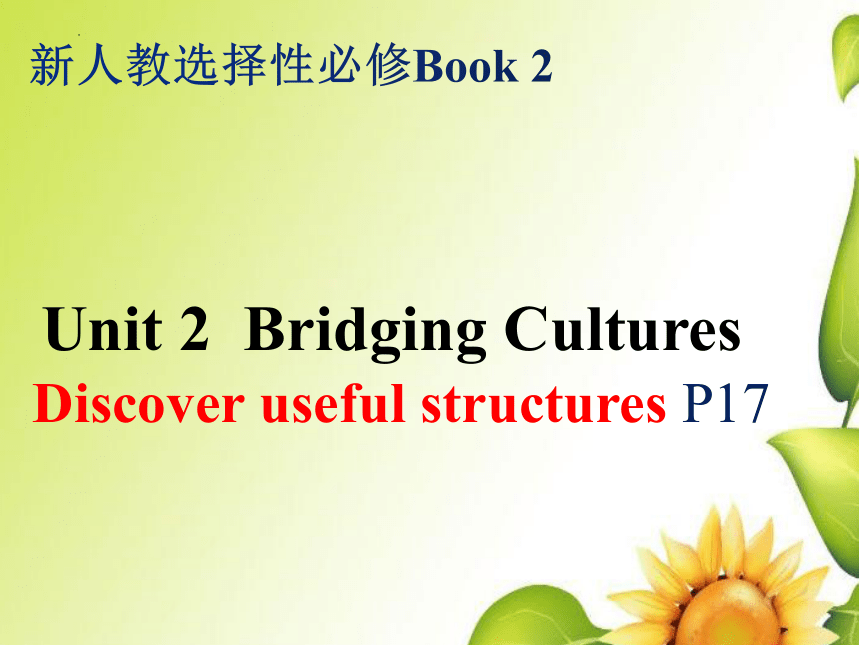 | |
| 格式 | pptx | ||
| 文件大小 | 1.6MB | ||
| 资源类型 | 教案 | ||
| 版本资源 | 人教版(2019) | ||
| 科目 | 英语 | ||
| 更新时间 | 2023-02-09 11:19:01 | ||
图片预览

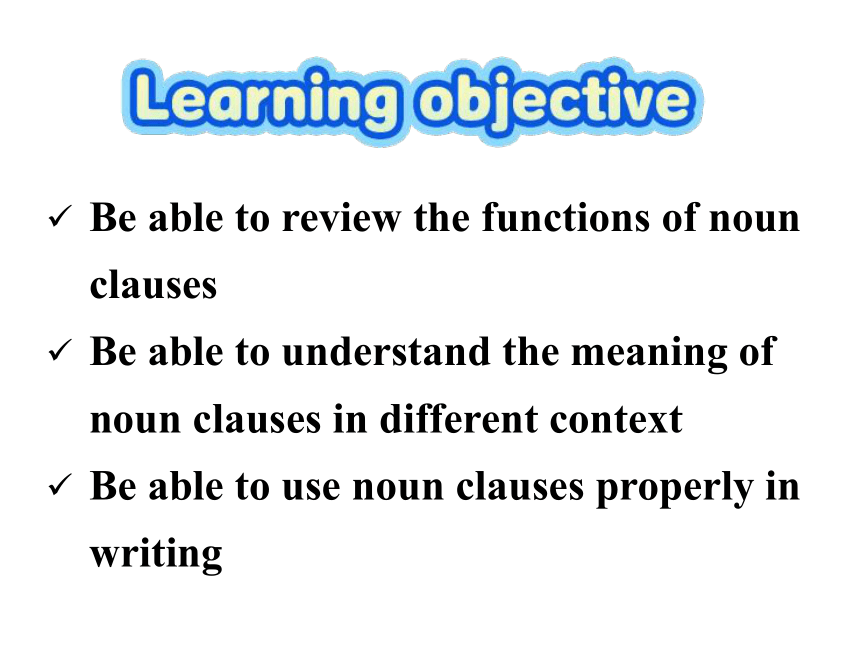
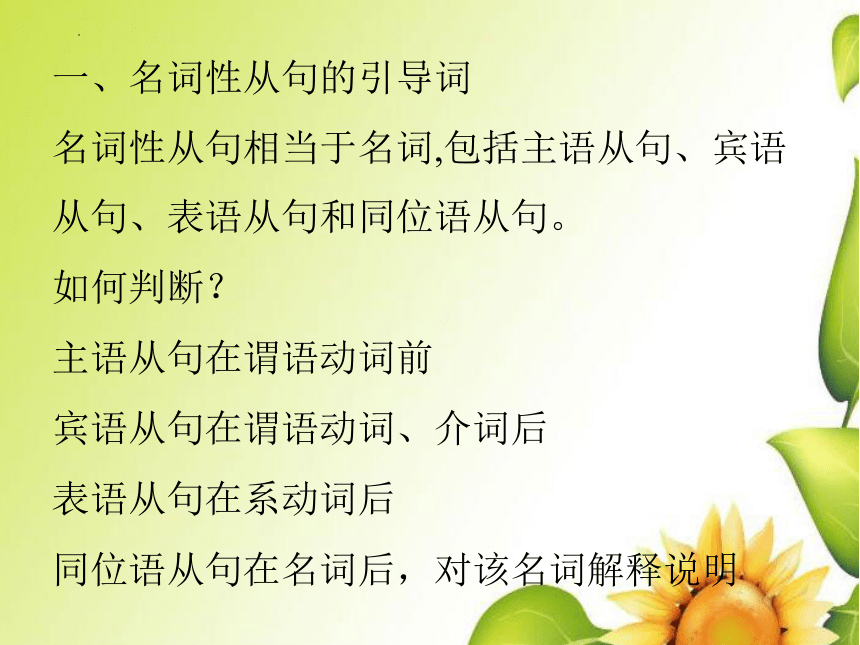
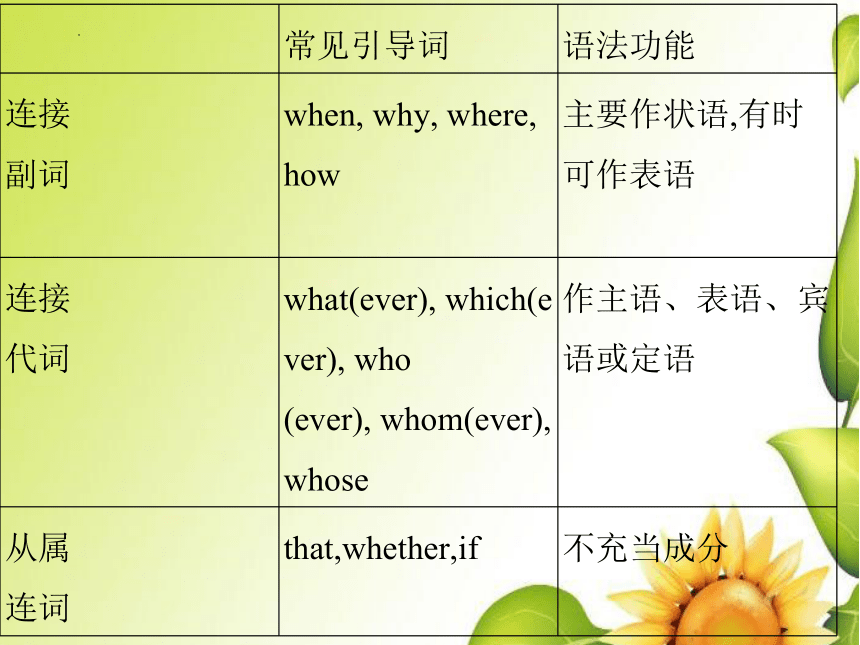
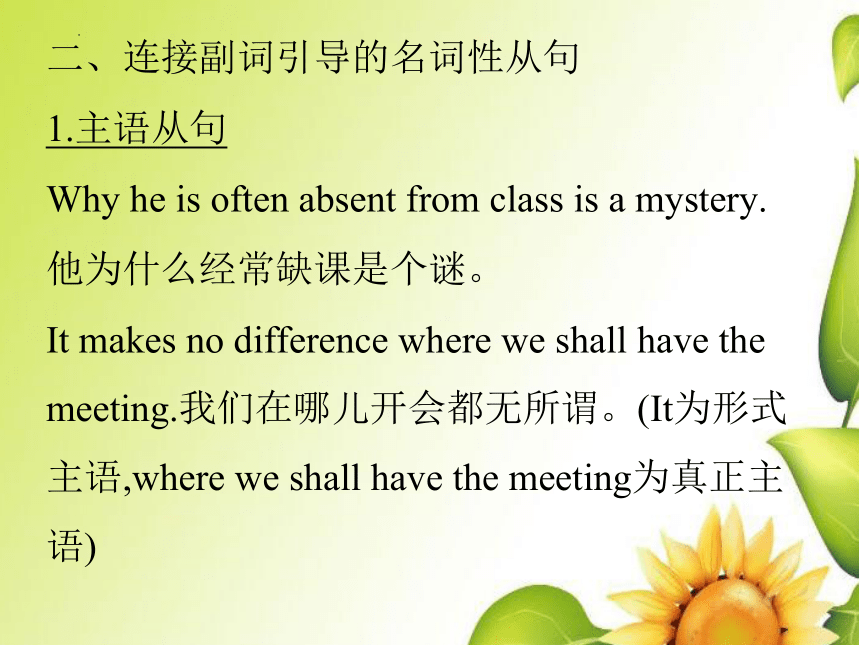

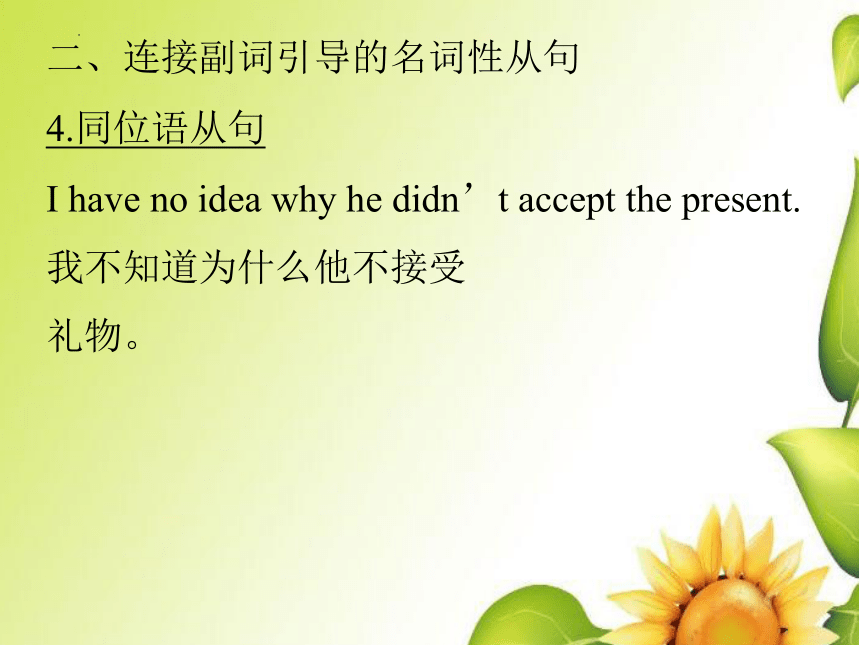
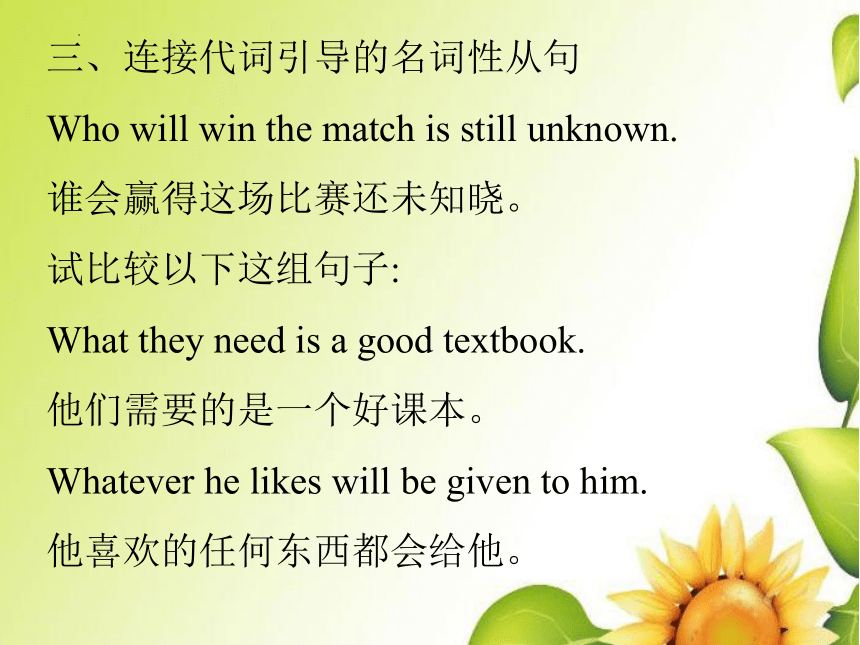

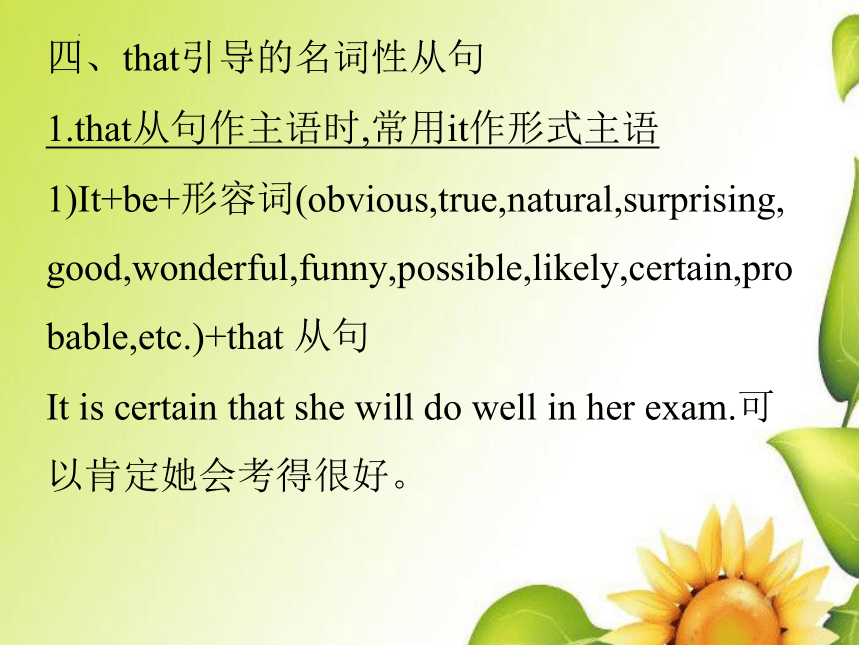
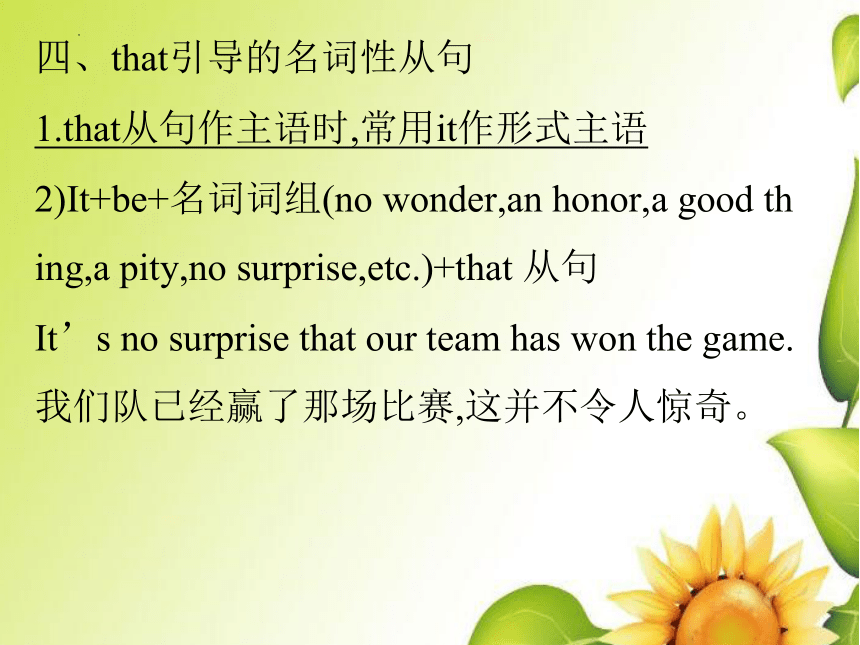
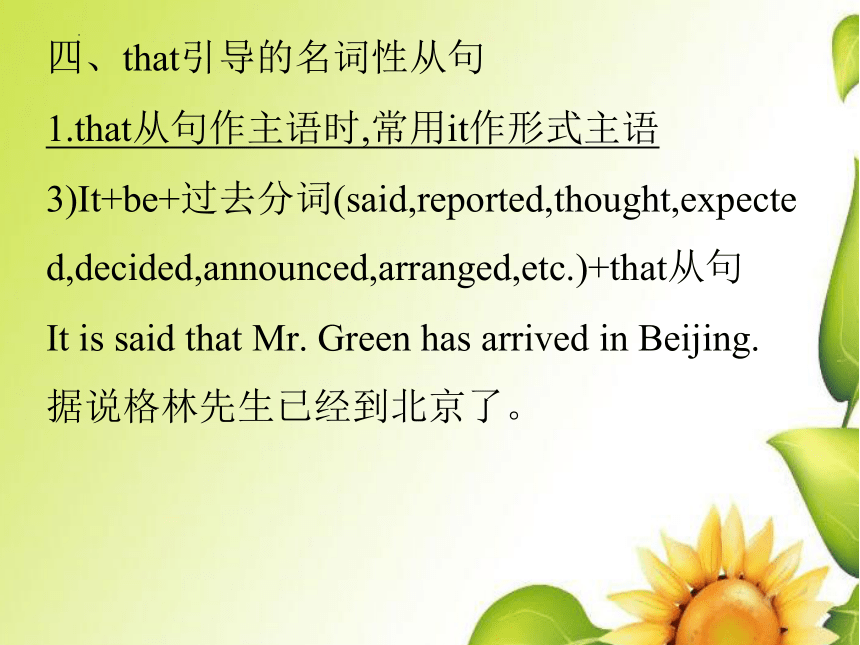
文档简介
(共38张PPT)
Discover useful structures P17
新人教选择性必修Book 2
Unit 2 Bridging Cultures
Be able to review the functions of noun clauses
Be able to understand the meaning of noun clauses in different context
Be able to use noun clauses properly in writing
一、名词性从句的引导词
名词性从句相当于名词,包括主语从句、宾语从句、表语从句和同位语从句。
如何判断?
主语从句在谓语动词前
宾语从句在谓语动词、介词后
表语从句在系动词后
同位语从句在名词后,对该名词解释说明
常见引导词 语法功能
连接 副词 when, why, where, how 主要作状语,有时可作表语
连接 代词 what(ever), which(ever), who
(ever), whom(ever),whose 作主语、表语、宾语或定语
从属 连词 that,whether,if 不充当成分
二、连接副词引导的名词性从句
1.主语从句
Why he is often absent from class is a mystery.
他为什么经常缺课是个谜。
It makes no difference where we shall have the meeting.我们在哪儿开会都无所谓。(It为形式主语,where we shall have the meeting为真正主语)
二、连接副词引导的名词性从句
2.宾语从句
I can’t imagine how he did it.
我不能想象他是如何做的这件事。
It all depends on how we solve the problem.
这完全要看我们如何解决这个问题。
3.表语从句
The problem is where we should stay.
问题是我们应该待在哪里。
二、连接副词引导的名词性从句
4.同位语从句
I have no idea why he didn’t accept the present. 我不知道为什么他不接受
礼物。
三、连接代词引导的名词性从句
Who will win the match is still unknown.
谁会赢得这场比赛还未知晓。
试比较以下这组句子:
What they need is a good textbook.
他们需要的是一个好课本。
Whatever he likes will be given to him.
他喜欢的任何东西都会给他。
三、连接代词引导的名词性从句
其中,what=the thing(s) that,意为:……的东西;whatever=anything that,意为:……的任何东西。what强调具体的事物本身,而whatever则不是为了指明具体的某件事物。
四、that引导的名词性从句
1.that从句作主语时,常用it作形式主语
1)It+be+形容词(obvious,true,natural,surprising,good,wonderful,funny,possible,likely,certain,probable,etc.)+that 从句
It is certain that she will do well in her exam.可以肯定她会考得很好。
四、that引导的名词性从句
1.that从句作主语时,常用it作形式主语
2)It+be+名词词组(no wonder,an honor,a good thing,a pity,no surprise,etc.)+that 从句
It’s no surprise that our team has won the game. 我们队已经赢了那场比赛,这并不令人惊奇。
四、that引导的名词性从句
1.that从句作主语时,常用it作形式主语
3)It+be+过去分词(said,reported,thought,expected,decided,announced,arranged,etc.)+that从句
It is said that Mr. Green has arrived in Beijing. 据说格林先生已经到北京了。
四、that引导的名词性从句
1.that从句作主语时,常用it作形式主语
4)It+动词或动词短语(seem, appear, happen, matter, turn out, prove, occur,etc.)+that从句
It happened that he was out.他碰巧出去了。
It proves that he is silly.事实证明他很愚蠢。
四、that引导的名词性从句
2.that从句作宾语
1)及物动词、be sure、介词in/except+that从句
Do you know(that)he has joined the army 你知道他参军了吗
He is a good student except that he is a little bit careless.他是个好学生,就是有点儿粗心。
四、that引导的名词性从句
2.that从句作宾语
2)及物动词+it+宾补+that从句
He has made it clear that he will not give in.
他不会屈服的,这一点他已经明确表示了。
四、that引导的名词性从句
2.that从句作宾语
3)某些动词或动词短语(hate, like, dislike, appreciate, see to, depend on等)+it+that从句
You should depend on it that I shall always help you.你要相信我会一直帮助你的。
四、that引导的名词性从句
3.that从句作表语,that一般不省略
My decision is that all of us are to start at 6 o clock tomorrow morning.我的决定是我们所有人明天早上6点出发。
五、whether/if(是否)引导的名词性从句
1.用法相同之处
1)whether和if都能引导宾语从句,常置于see,ask,learn,tell,wonder,doubt,find out等动词(短语)之后。
He asked me whether/if I could help him.
他问我是否能帮助他。
五、whether/if(是否)引导的名词性从句
1.用法相同之处
2)whether和if都可用在it作形式主语的从句中。
It’s uncertain whether/if he’ll come this evening.他今晚是否来还不确定。
五、whether/if(是否)引导的名词性从句
1.用法相同之处
3)在be uncertain/doubtful之后,常用whether引导宾语从句,有时也可以用if。
We are uncertain whether/if Mary will come.我们不确定玛丽是否会来。
五、whether/if(是否)引导的名词性从句
2.用法不同之处
1)whether可置于句首引导主语从句,而if不能。
Whether the meeting will be held is still a problem.是否将开会仍然是个问题。
五、whether/if(是否)引导的名词性从句
2.用法不同之处
2)whether可用在介词之后,引导宾语从句,而if则不能。
Success depends on whether we make enough effort.成功取决于我们是否足够努力。
五、whether/if(是否)引导的名词性从句
2.用法不同之处
3)whether可引导表语从句,if则不能。
The question is whether it is worth doing.
问题是它是否值得做。
五、whether/if(是否)引导的名词性从句
2.用法不同之处
4)在名词之后引导同位语从句时,用whether而不用if。
The question whether it is right depends on the result.它是对是错的问题要看结果。
五、whether/if(是否)引导的名词性从句
2.用法不同之处
5)whether后可接不定式,而if不能。
Please tell us whether to go or stay here.
请告诉我们是走还是待在这里。
五、whether/if(是否)引导的名词性从句
2.用法不同之处
6)在有些动词(如discuss)之后,只能用whether,而不用if引导宾语从句。
We discussed whether we should close the shop.我们讨论了是否应该关掉商店。
五、whether/if(是否)引导的名词性从句
2.用法不同之处
7)在引导否定概念的宾语从句时,只能用if,而不用whether。
He asked me if I hadn’t finished my work.
他问我是否还没有完成工作。
易混易错点突破
一、that与what引导名词性从句的区别
代词 区别 例句
that 不可省略(宾语从句除外),在从句中不作成分,没有词义 That he will succeed is obvious.
显然,他会成功。
what 不可省略,在从句中作成分,有词义 What she told me is not true. 她所告诉我的不是真的。
易混易错点突破
二、why 与 because 引导表语从句的区别
why强调结果,because强调原因。
I had a cold. That’s why I didn’t attend school.
我感冒了,因此我没上学。
I didn’t attend school. That’s because I had a cold. 我没上学,那是因为我感冒了。
易混易错点突破
三、doubt后的名词性从句
doubt作动词时其后的宾语从句与作名词时其后的同位语从句
肯定形式 否定形式
I doubt whether/if it’s true.我怀疑它是不是真实的。 I have some doubt whether he will come.他是否会来,我有些疑问。 I don’t doubt that you are honest.我不怀疑你的诚实。
There is no doubt that we will win.毫无疑问,我们会赢。
Combine each pair of sentences using the words
in brackets.
Practice
1 The advisor talked about maintaining reasonable expectations
when studying abroad. His words were quite helpful to May.
(What)
____________________________________________________
____________________________________________________
2 Students have to write countless research papers as part of their
coursework. This was not something that Chen Hao was ready for.
(that)
____________________________________________________
____________________________________________________
____________________________________________________
3 Who will be the successful applicant for the summer job at the
law firm This is the question. (who)
____________________________________________________
____________________________________________________
What the advisor talked about maintaining reasonable expectations when studying abroad was quite helpful to May.
That students have to write countless research papers as
part of their coursework was not something that Chen Hao was ready for.
The question is who will be the successful applicant for the
summer job at the law firm.
4 Exposure to another culture and its people can give exchange
students great insights into the outside world. This is an
advantage of studying abroad. (that)
________________________________________________________________________________________________________
____________________________________________________
5 Schools in the States are quite multicultural, with students and
teachers from many different ethnic backgrounds. This
impressed Liu Yang. (that)
________________________________________________________________________________________________________
____________________________________________________
6 Should she stick to her own way of life or follow the American
way This is her confusion. (whether)
________________________________________________________________________________________________________
An advantage of studying abroad is that exposure to
another culture and its people can give exchange students great insights into the world.
It impressed Liu Yang that schools in the States are quite multiculural, with students and teachers from many different ethnic backgrounds.
Her confusion is whether she should stick to her own way of life or follow the American way.
Production
Complete the passage with A–D from the box.
A that he enjoys being with Chinese people
B how he can learn to appreciate it more deeply
C what impressed him first
D that people can eat almost everything with chopsticks
After just a few months in China, Leon, an exchange student from
Germany, says that he has fallen in love with Chinese culture. ____
was the Chinese food. He couldn’t believe how many different kinds of Chinese food there are! Something else he found impressive was ____. Then there’s China’s colourful culture, from art to music, and calligraphy to literature. _____ remains an important goal for him as he is truly fascinated by it. Leon is also amazed by the convenience of cashless payments in China. He can go outside without any need for cash—all he needs is his mobile phone! The biggest reason why he loves China, however, is_____. He has made great friends here—friends that he will still remember long after his departure.
C
D
B
A
3
What other things do you think might attract
international students to China
Learning more about traditional Chinese medicine
Experiencing the technology boom and all the fast and convenient ways via apps on your smartphone
Seeing important historical monuments such as the Great Wall and the Terracotta Warriors Museum
Talk about Xie Lei’s experience by completing
the following sentences with your own words.
1 That... made Xie Lei confused at first.
2 It surprised Xie Lei that ...
3 What Xie Lei’s tutor wanted to say was that ...
4 The motivation for Xie Lei to study abroad was that...
3
Work in pairs:
Suggested Answers:
1 That people in London speak fast and use unfamiliar
words made Xie Lei confused at first.
2 It surprised Xie Lei that her host family are so keen to
learn about China.
3 What Xie Lei’s tutor wanted to say was that she must
acknowledge what other people had said if she cited their
ideas.
4 The motivation for Xie Lei to study abroad was that she
wanted to learn about global
business and improve her
English so that she could set
up a business in China after
graduation.
Xie Lei studying abroad
That people in London speak fast
and use familiar words made Xie
Lei confused at first. It surprised
Xie Lei that her host family are so
keen to learn about China. What Xie Lei’s tutor wanted to say was that she must acknowledge what other people had said if she cited their ideas. The motivation for Xie Lei to study abroad was that she wanted to learn about global business and improve her English so that she could set up a business in China after graduation. Xie Lei said that besides studying hard, she also participated in various social activities. Acting as a cultural messenger is what she didn't expect to do before going abroad.
Thank you!
Discover useful structures P17
新人教选择性必修Book 2
Unit 2 Bridging Cultures
Be able to review the functions of noun clauses
Be able to understand the meaning of noun clauses in different context
Be able to use noun clauses properly in writing
一、名词性从句的引导词
名词性从句相当于名词,包括主语从句、宾语从句、表语从句和同位语从句。
如何判断?
主语从句在谓语动词前
宾语从句在谓语动词、介词后
表语从句在系动词后
同位语从句在名词后,对该名词解释说明
常见引导词 语法功能
连接 副词 when, why, where, how 主要作状语,有时可作表语
连接 代词 what(ever), which(ever), who
(ever), whom(ever),whose 作主语、表语、宾语或定语
从属 连词 that,whether,if 不充当成分
二、连接副词引导的名词性从句
1.主语从句
Why he is often absent from class is a mystery.
他为什么经常缺课是个谜。
It makes no difference where we shall have the meeting.我们在哪儿开会都无所谓。(It为形式主语,where we shall have the meeting为真正主语)
二、连接副词引导的名词性从句
2.宾语从句
I can’t imagine how he did it.
我不能想象他是如何做的这件事。
It all depends on how we solve the problem.
这完全要看我们如何解决这个问题。
3.表语从句
The problem is where we should stay.
问题是我们应该待在哪里。
二、连接副词引导的名词性从句
4.同位语从句
I have no idea why he didn’t accept the present. 我不知道为什么他不接受
礼物。
三、连接代词引导的名词性从句
Who will win the match is still unknown.
谁会赢得这场比赛还未知晓。
试比较以下这组句子:
What they need is a good textbook.
他们需要的是一个好课本。
Whatever he likes will be given to him.
他喜欢的任何东西都会给他。
三、连接代词引导的名词性从句
其中,what=the thing(s) that,意为:……的东西;whatever=anything that,意为:……的任何东西。what强调具体的事物本身,而whatever则不是为了指明具体的某件事物。
四、that引导的名词性从句
1.that从句作主语时,常用it作形式主语
1)It+be+形容词(obvious,true,natural,surprising,good,wonderful,funny,possible,likely,certain,probable,etc.)+that 从句
It is certain that she will do well in her exam.可以肯定她会考得很好。
四、that引导的名词性从句
1.that从句作主语时,常用it作形式主语
2)It+be+名词词组(no wonder,an honor,a good thing,a pity,no surprise,etc.)+that 从句
It’s no surprise that our team has won the game. 我们队已经赢了那场比赛,这并不令人惊奇。
四、that引导的名词性从句
1.that从句作主语时,常用it作形式主语
3)It+be+过去分词(said,reported,thought,expected,decided,announced,arranged,etc.)+that从句
It is said that Mr. Green has arrived in Beijing. 据说格林先生已经到北京了。
四、that引导的名词性从句
1.that从句作主语时,常用it作形式主语
4)It+动词或动词短语(seem, appear, happen, matter, turn out, prove, occur,etc.)+that从句
It happened that he was out.他碰巧出去了。
It proves that he is silly.事实证明他很愚蠢。
四、that引导的名词性从句
2.that从句作宾语
1)及物动词、be sure、介词in/except+that从句
Do you know(that)he has joined the army 你知道他参军了吗
He is a good student except that he is a little bit careless.他是个好学生,就是有点儿粗心。
四、that引导的名词性从句
2.that从句作宾语
2)及物动词+it+宾补+that从句
He has made it clear that he will not give in.
他不会屈服的,这一点他已经明确表示了。
四、that引导的名词性从句
2.that从句作宾语
3)某些动词或动词短语(hate, like, dislike, appreciate, see to, depend on等)+it+that从句
You should depend on it that I shall always help you.你要相信我会一直帮助你的。
四、that引导的名词性从句
3.that从句作表语,that一般不省略
My decision is that all of us are to start at 6 o clock tomorrow morning.我的决定是我们所有人明天早上6点出发。
五、whether/if(是否)引导的名词性从句
1.用法相同之处
1)whether和if都能引导宾语从句,常置于see,ask,learn,tell,wonder,doubt,find out等动词(短语)之后。
He asked me whether/if I could help him.
他问我是否能帮助他。
五、whether/if(是否)引导的名词性从句
1.用法相同之处
2)whether和if都可用在it作形式主语的从句中。
It’s uncertain whether/if he’ll come this evening.他今晚是否来还不确定。
五、whether/if(是否)引导的名词性从句
1.用法相同之处
3)在be uncertain/doubtful之后,常用whether引导宾语从句,有时也可以用if。
We are uncertain whether/if Mary will come.我们不确定玛丽是否会来。
五、whether/if(是否)引导的名词性从句
2.用法不同之处
1)whether可置于句首引导主语从句,而if不能。
Whether the meeting will be held is still a problem.是否将开会仍然是个问题。
五、whether/if(是否)引导的名词性从句
2.用法不同之处
2)whether可用在介词之后,引导宾语从句,而if则不能。
Success depends on whether we make enough effort.成功取决于我们是否足够努力。
五、whether/if(是否)引导的名词性从句
2.用法不同之处
3)whether可引导表语从句,if则不能。
The question is whether it is worth doing.
问题是它是否值得做。
五、whether/if(是否)引导的名词性从句
2.用法不同之处
4)在名词之后引导同位语从句时,用whether而不用if。
The question whether it is right depends on the result.它是对是错的问题要看结果。
五、whether/if(是否)引导的名词性从句
2.用法不同之处
5)whether后可接不定式,而if不能。
Please tell us whether to go or stay here.
请告诉我们是走还是待在这里。
五、whether/if(是否)引导的名词性从句
2.用法不同之处
6)在有些动词(如discuss)之后,只能用whether,而不用if引导宾语从句。
We discussed whether we should close the shop.我们讨论了是否应该关掉商店。
五、whether/if(是否)引导的名词性从句
2.用法不同之处
7)在引导否定概念的宾语从句时,只能用if,而不用whether。
He asked me if I hadn’t finished my work.
他问我是否还没有完成工作。
易混易错点突破
一、that与what引导名词性从句的区别
代词 区别 例句
that 不可省略(宾语从句除外),在从句中不作成分,没有词义 That he will succeed is obvious.
显然,他会成功。
what 不可省略,在从句中作成分,有词义 What she told me is not true. 她所告诉我的不是真的。
易混易错点突破
二、why 与 because 引导表语从句的区别
why强调结果,because强调原因。
I had a cold. That’s why I didn’t attend school.
我感冒了,因此我没上学。
I didn’t attend school. That’s because I had a cold. 我没上学,那是因为我感冒了。
易混易错点突破
三、doubt后的名词性从句
doubt作动词时其后的宾语从句与作名词时其后的同位语从句
肯定形式 否定形式
I doubt whether/if it’s true.我怀疑它是不是真实的。 I have some doubt whether he will come.他是否会来,我有些疑问。 I don’t doubt that you are honest.我不怀疑你的诚实。
There is no doubt that we will win.毫无疑问,我们会赢。
Combine each pair of sentences using the words
in brackets.
Practice
1 The advisor talked about maintaining reasonable expectations
when studying abroad. His words were quite helpful to May.
(What)
____________________________________________________
____________________________________________________
2 Students have to write countless research papers as part of their
coursework. This was not something that Chen Hao was ready for.
(that)
____________________________________________________
____________________________________________________
____________________________________________________
3 Who will be the successful applicant for the summer job at the
law firm This is the question. (who)
____________________________________________________
____________________________________________________
What the advisor talked about maintaining reasonable expectations when studying abroad was quite helpful to May.
That students have to write countless research papers as
part of their coursework was not something that Chen Hao was ready for.
The question is who will be the successful applicant for the
summer job at the law firm.
4 Exposure to another culture and its people can give exchange
students great insights into the outside world. This is an
advantage of studying abroad. (that)
________________________________________________________________________________________________________
____________________________________________________
5 Schools in the States are quite multicultural, with students and
teachers from many different ethnic backgrounds. This
impressed Liu Yang. (that)
________________________________________________________________________________________________________
____________________________________________________
6 Should she stick to her own way of life or follow the American
way This is her confusion. (whether)
________________________________________________________________________________________________________
An advantage of studying abroad is that exposure to
another culture and its people can give exchange students great insights into the world.
It impressed Liu Yang that schools in the States are quite multiculural, with students and teachers from many different ethnic backgrounds.
Her confusion is whether she should stick to her own way of life or follow the American way.
Production
Complete the passage with A–D from the box.
A that he enjoys being with Chinese people
B how he can learn to appreciate it more deeply
C what impressed him first
D that people can eat almost everything with chopsticks
After just a few months in China, Leon, an exchange student from
Germany, says that he has fallen in love with Chinese culture. ____
was the Chinese food. He couldn’t believe how many different kinds of Chinese food there are! Something else he found impressive was ____. Then there’s China’s colourful culture, from art to music, and calligraphy to literature. _____ remains an important goal for him as he is truly fascinated by it. Leon is also amazed by the convenience of cashless payments in China. He can go outside without any need for cash—all he needs is his mobile phone! The biggest reason why he loves China, however, is_____. He has made great friends here—friends that he will still remember long after his departure.
C
D
B
A
3
What other things do you think might attract
international students to China
Learning more about traditional Chinese medicine
Experiencing the technology boom and all the fast and convenient ways via apps on your smartphone
Seeing important historical monuments such as the Great Wall and the Terracotta Warriors Museum
Talk about Xie Lei’s experience by completing
the following sentences with your own words.
1 That... made Xie Lei confused at first.
2 It surprised Xie Lei that ...
3 What Xie Lei’s tutor wanted to say was that ...
4 The motivation for Xie Lei to study abroad was that...
3
Work in pairs:
Suggested Answers:
1 That people in London speak fast and use unfamiliar
words made Xie Lei confused at first.
2 It surprised Xie Lei that her host family are so keen to
learn about China.
3 What Xie Lei’s tutor wanted to say was that she must
acknowledge what other people had said if she cited their
ideas.
4 The motivation for Xie Lei to study abroad was that she
wanted to learn about global
business and improve her
English so that she could set
up a business in China after
graduation.
Xie Lei studying abroad
That people in London speak fast
and use familiar words made Xie
Lei confused at first. It surprised
Xie Lei that her host family are so
keen to learn about China. What Xie Lei’s tutor wanted to say was that she must acknowledge what other people had said if she cited their ideas. The motivation for Xie Lei to study abroad was that she wanted to learn about global business and improve her English so that she could set up a business in China after graduation. Xie Lei said that besides studying hard, she also participated in various social activities. Acting as a cultural messenger is what she didn't expect to do before going abroad.
Thank you!
